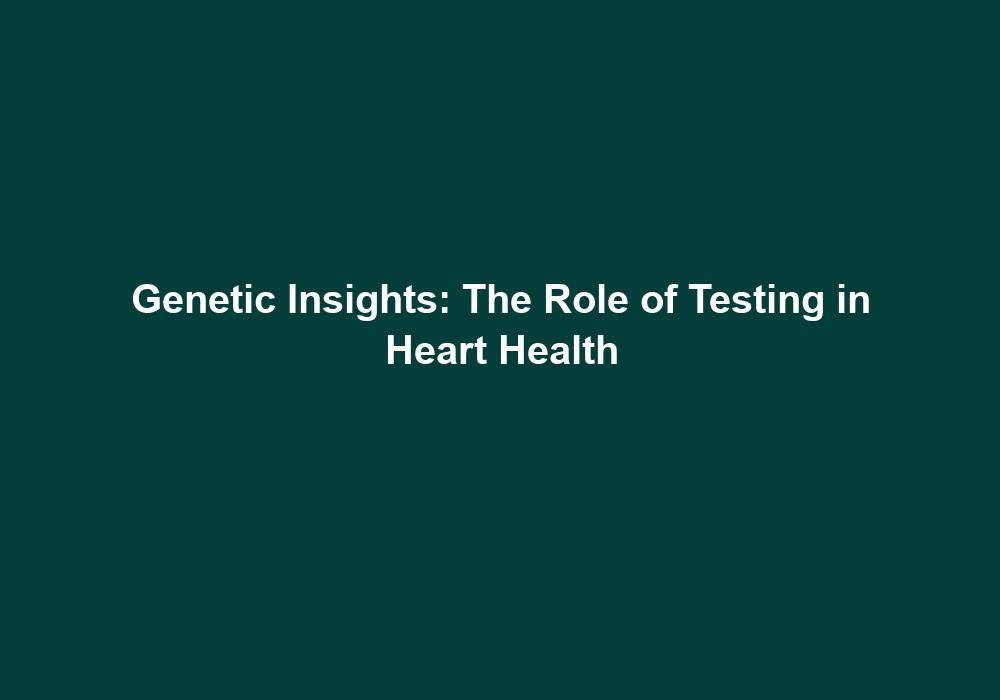Genetic Insights: The Role of Testing in Heart Health
Heart health is of utmost importance, especially with the increasing incidence of cardiovascular diseases worldwide. One significant advancement in this field is the use of genetic testing to gain valuable insights into an individual’s risk factors, potential genetic abnormalities, and personalized treatment approaches. In this article, we will explore the role of genetic testing in assessing heart health, its benefits, and how it is transforming the landscape of cardiovascular care.
Understanding Genetic Testing
Genetic testing involves analyzing an individual’s DNA to identify changes or variations in specific genes that may impact their health. This testing can be done through a simple blood sample or a saliva sample, and the results can offer valuable information about an individual’s inherited risk factors for various diseases, including heart conditions.
Genetic testing provides a deeper understanding of an individual’s genetic makeup, allowing healthcare professionals to assess their predisposition to certain heart conditions. By identifying specific genetic markers associated with cardiovascular health, they can estimate an individual’s lifetime risk of developing conditions like coronary artery disease, stroke, or heart failure. This information enables early intervention and targeted preventive strategies.
Genetic testing is particularly beneficial in identifying individuals with hereditary heart conditions. Certain genetic mutations or variations can significantly increase a person’s risk of developing conditions such as hypertrophic cardiomyopathy, arrhythmias, or familial hypercholesterolemia. By detecting these conditions early, healthcare professionals can implement timely interventions and preventive strategies to reduce the risk of heart-related complications.
Assessing Genetic Risk Factors for Heart Diseases
-
Hereditary Heart Conditions: Genetic testing plays a crucial role in identifying hereditary heart conditions. Certain genetic mutations or variations can significantly increase a person’s risk of developing conditions such as hypertrophic cardiomyopathy, arrhythmias, or familial hypercholesterolemia. By detecting these conditions early, healthcare professionals can implement timely interventions and preventive strategies to reduce the risk of heart-related complications.
-
Risk Prediction: Genetic testing can help predict an individual’s risk of developing heart diseases. By analyzing specific genetic markers associated with cardiovascular health, healthcare professionals can estimate an individual’s lifetime risk of developing conditions like coronary artery disease, stroke, or heart failure. This information enables early intervention and targeted preventive strategies.
-
Inherited Cholesterol Disorders: Genetic testing allows the identification of individuals with inherited cholesterol disorders, such as familial hypercholesterolemia. Detecting these conditions early can enable timely interventions and preventive strategies to reduce the risk of heart-related complications. Genetic testing can also provide valuable insights into an individual’s response to cholesterol-lowering medications, helping healthcare professionals tailor treatment plans accordingly.
Genetic testing provides valuable insights into an individual’s genetic predisposition to certain heart diseases, allowing for personalized treatment approaches. By understanding an individual’s genetic makeup, healthcare professionals can tailor treatment plans to meet specific needs, minimize adverse reactions, and optimize therapeutic outcomes. This approach, known as precision medicine, holds great promise in the field of cardiovascular care.
Genetic testing can also help predict an individual’s response to certain medications commonly used in treating heart conditions. By analyzing an individual’s genetic profile, healthcare providers can choose the most effective medications and avoid drugs that may cause adverse reactions or be less effective. This personalized approach to medication selection enhances treatment outcomes and minimizes potential risks.
Comprehensive genetic testing can provide valuable insights into an individual’s genetic predisposition to certain lifestyle-related heart diseases, such as obesity, hypertension, or diabetes. By understanding their genetic risks, individuals can make informed decisions about their lifestyle choices, including diet, exercise, and stress management. This personalized approach empowers individuals to take control of their heart health and adopt preventive measures to reduce their risk of developing cardiovascular diseases.
Advantages of Genetic Testing
-
Early Detection: Genetic testing can identify potential risk factors for heart diseases long before symptoms manifest. This early detection allows individuals to take proactive measures to prevent or manage their risks effectively. Early intervention can significantly improve outcomes and potentially save lives.
-
Improved Risk Assessment: Genetic testing provides a more accurate assessment of an individual’s risk for developing various heart conditions than traditional risk assessment tools. This enables healthcare professionals to develop personalized prevention and treatment strategies tailored to the individual’s genetic profile. By considering an individual’s genetic predisposition, healthcare professionals can implement targeted interventions to reduce the risk of developing heart diseases.
-
Family Screening: Genetic testing not only benefits the individual undergoing the test but also their family members. By identifying genetic abnormalities or mutations, family members can be informed of their own potential risks, allowing them to undergo appropriate testing and take preventive measures. This approach facilitates early detection and intervention within families, potentially preventing the occurrence of heart diseases in multiple generations.
Limitations and Ethical Considerations
-
Limited Predictive Power: While genetic testing can provide valuable insights, it is important to note that not all genetic variations have a clear link to heart diseases. The presence of a genetic abnormality does not guarantee the development of a specific condition. Therefore, it is crucial to interpret genetic test results in conjunction with clinical assessments and other diagnostic tools.
-
Psychological Impact: Genetic testing results may have psychological implications for individuals and their families. Receiving information about an increased risk of heart diseases can lead to anxiety, stress, or depression. Thus, genetic counseling is vital in helping individuals understand and cope with the results. Genetic counselors provide support, guidance, and education to help individuals make informed decisions about their health.
-
Privacy and Confidentiality: Genetic testing involves the analysis of highly personal and sensitive information. Strict privacy regulations and measures are necessary to protect individuals’ genetic data from unauthorized access and misuse. Healthcare providers and genetic testing laboratories must adhere to stringent security protocols to ensure the privacy and confidentiality of individuals’ genetic information.
The Future of Genetic Testing in Heart Health
Genetic testing holds immense potential in the field of heart health and continues to evolve rapidly. Here are a few areas of future development:
-
Advancements in Testing Techniques: As technology advances, genetic testing methods are becoming more efficient, accurate, and accessible, allowing for broader population screening and improved diagnoses. New techniques, such as next-generation sequencing, offer enhanced capabilities for identifying genetic variations associated with heart diseases.
-
Integration of Big Data and Artificial Intelligence: The integration of big data and artificial intelligence can enhance the interpretation of genetic test results. This integration can help identify complex genetic interactions, patterns, and associations, leading to more precise risk assessment and targeted treatment approaches. Artificial intelligence algorithms can analyze vast datasets to identify genetic predispositions and recommend personalized interventions.
-
Genetic Testing as a Preventive Tool: With increasing awareness and accessibility, genetic testing has the potential to become a preventive tool rather than just a diagnostic tool. By identifying genetic risk factors early in life, individuals can adopt lifestyle modifications and targeted interventions to mitigate their risks effectively. This shift from reactive to proactive healthcare has the potential to significantly reduce the burden of heart diseases.
In conclusion, genetic testing plays a vital role in assessing heart health, identifying hereditary conditions, predicting risks, and enabling personalized treatment approaches. It offers numerous advantages, including early detection, improved risk assessment, and the ability to tailor interventions based on an individual’s genetic profile. Despite certain limitations and ethical considerations, the future of genetic testing in heart health holds immense promise, paving the way for more precise and personalized cardiovascular care.







